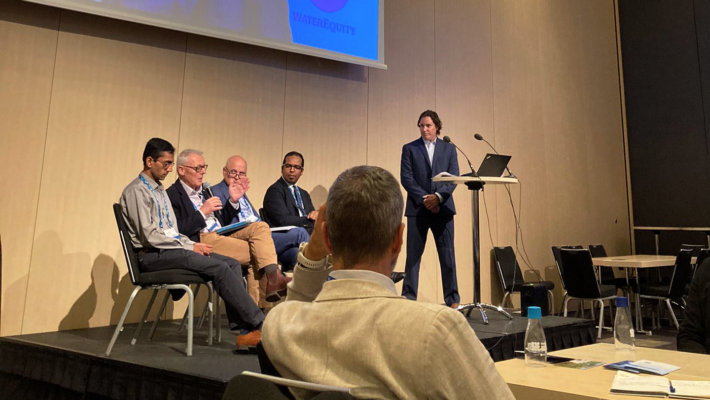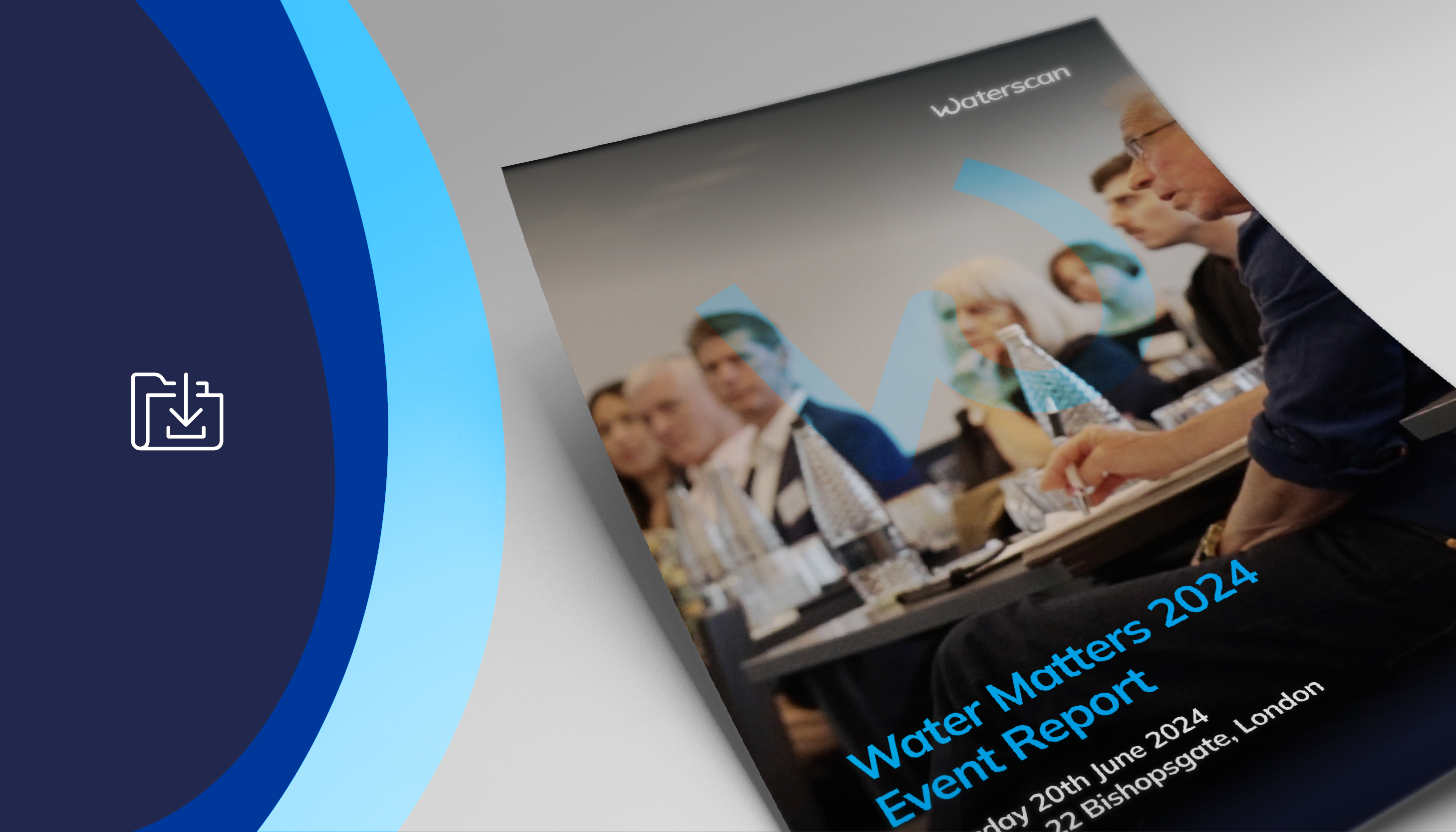Highlights from the fifth day of World Water Week.
After five intense days of discussions on the theme Seeds of Change: Innovative Solutions for a Water-Wise World, World Water Week has come to a close. With a record number of participants from almost every country on Earth, will we be able to look back on this week as the one that triggered a turning point in the way that we value, use and safeguard our most vital resource? Well, that is down to each and everyone of us.
Key takeaways
- Interconnectivity is crucial. With the theme Seeds of Change, many speakers emphasised the need to talk more about howto make transformations happen, rather than just listing problems. There was a strong focus on intergenerational dialogues and learning from each other. The critical role of trust and inclusion was also frequently mentioned.
- Time to rethink innovation. Some eyebrows were raised when the theme was first presented last year since many people still primarily associate innovation with technology. But innovation is a much broader concept and World Water Week showcased innovation also in governance, finance, values, and culture. It also became clear how essential it is to apply a gender lens.
- Learning from Indigenous Peoples. For the first time, World Water Week had a special focus on Indigenous Peoples’ knowledge, with representatives from some 20 groups present to share their views and experiences, and the importance of values such as reciprocity, respect, and relations.
- Oceans are making waves. An interesting trend this year was that all the three winning teams of the Stockholm Junior Water Prize had an ocean focus. To young scientists it’s clear that it doesn’t make sense to treat freshwater, coasts and oceans as separate entities. The source-to-sea approach is increasingly becoming the new norm.
- New approaches to water governance. The Global Commission on the Economics of Water will report on how we need to change incentives and governance related to water. Why that is needed became very evident through new research on the pressure we are currently putting on the global water cycle and the consequences of this.
- Linking international processes. A growing number of convenors use World Water Week to create sessions that prepare for international processes, for example the upcoming SDG Summit in September and the climate meeting COP28 in December. The Week also followed up on the UN 2023 Water Conference in March and analysed progress so far on the Water Action Agenda.
Top sessions
Water in Business: Stepping Up to Achieve Change
Speakers: Christopher Flensborg. SEB – Head Of Climate And Sustainable Finance / Claire Elsdon – CDP, Global Director – Capital Markets
Attended by: Esmond Bowerman – Sustainability Manager, Waterscan
Addressing the water security crisis relies on leveraging financial mechanisms. Therefore, integrating water concerns into financial models, investment strategies, and business frameworks is paramount, and water risk assessments should be a fundamental step before finalising any financial transactions. Engagement between the finance and water sectors is crucial. The willingness of financial institutions to invest time and effort into understanding water-related challenges, as demonstrated by their presence at events like this, holds promise for fostering collaboration between the sectors.
Key takeaways
- There’s a growing awareness among financial institutions of water’s material risks to their current and future portfolios. Building alliances to address these risks and engender systematic change is the next step.
- Achieving water security involves translating data into actionable insights. Data is essential for justifying decisions and building credibility, but it must be translated to enable diverse stakeholders to understand and act upon it.
- Benchmarking and creating storylines around sustainable practices enable finance professionals to advocate for integrating water concerns within their organisations.
Global Commission on the Economics of Water – Next Steps
Speakers: Johan Rockstrom – Director, Potsdam Institute for Climate Impact Research & Richard Damania – Chief Economist, Sustainable Development V-President, World Bank
Attended by: Sindiso Bango-Dube – Head of Market Development, Waterscan
Current water management systems are unsustainable, inefficient and inequitable. Current challenges and opportunities facing the water sector include climate change, population growth, environmental degradation, regulatory reform, technological innovation, and public engagement. A new approach based on three principles is proposed: i) water as a public good, ii) water as a common resource, and iii) water as a shared responsibility.
A series of recommendations were made to implement the proposed new approach: 1) creating a national water strategy, 2) establishing regional water boards, 3) reforming water abstraction and pricing, 4) promoting water efficiency and innovation, 5) enhancing water quality and biodiversity, and 6) strengthening water governance and accountability.
Key takeaways
- Water is not something that we can lock in at a local level. Freshwater should be declared a global common good to ensure that safe water and sanitation are a right for all people. We now have the technology to manage this, including the ability to quantify the import/export of rainwater at country level.
- The water sector needs to be able to talk the language of food, of health, of climate, of agriculture, of energy, of finance and of politics.
- We must rethink how water is valued and who owns it, and understand all water flows – including atmospheric moisture transport.
The focus is normally on water as a victim of climate change, not recognising that water is actually a driver of stability on the planet.
From World Water Week to COP28: Accelerating Water and Climate
Speakers: Various
Attended by: Esmond Bowerman – Sustainability Manager, Waterscan
2023 marks a pivotal year in the COP timeline, being the midpoint to the 2030 target set by the Paris Agreement. A global stocktaking has evaluated climate action over the past seven years, revealing the need to accelerate efforts to meet these goals. The COP 28 Water agenda will focus on levers of action, with an emphasis on collaboration across sectors and the continuity of initiatives beyond the conference. The three pillars identified, which align with the broader agenda of COP 28, are: protecting and restoring freshwater ecosystems, accelerating urban water resilience, and building water-resilient food systems.
Key takeaways
- It’s the first time in the history of the planet, that we collectively as a human race have fundamentally altered the water cycle.
- At the midpoint to the 2030 climate targets, we need to accelerate efforts to achieve them.
- Collaboration must extend beyond the water sector: widespread contributions, ideas, and recommendations are invaluable in shaping the path to success at COP 28.
- Climate and water are inextricably linked – without addressing the climate crisis, we can’t address the global water crisis and vice versa. Further, water should be viewed as a climate solution: adaptation, resilience, and nature-based solutions all depend on good water management.
Integrate water into everything we do. Everything we do needs to have a water dimension.
Day five in numbers
- 15,000 people took part in World Water Week 2023.
- Bringing it home: in England:
- Just 45% of water abstracted from the environment reaches the end user.
- 20% of water supplied to households is lost through leakage.
- Over-abstraction and pollution have reduced 86% of rivers and 44% of groundwater bodies to below good ecological status.
- 90% of wetlands and 13% of freshwater species have been lost since 1970.
Final thoughts
Water needs to be managed globally and inclusively. However, this is incredibly complex, so all parties need to stop looking inwards and start collaborating to create joint solutions and deliver the transformations necessary for a water-secure future for all.
We need to look outside our blue bubble.




